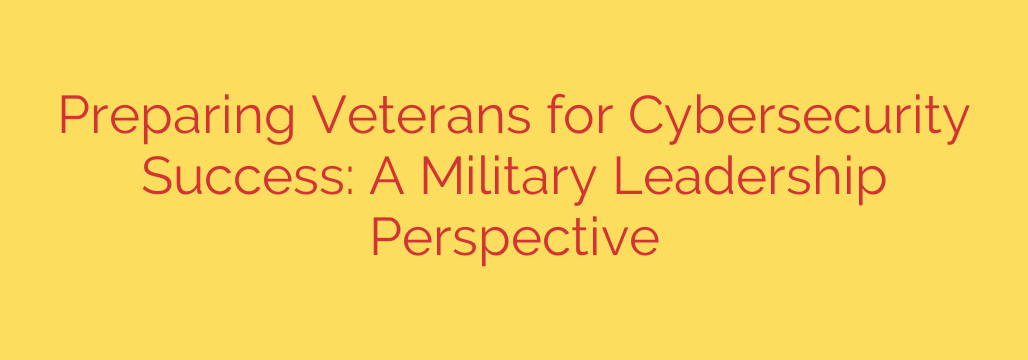
From the Front Lines to the Firewall: Why Veterans Are Uniquely Qualified for Cybersecurity
The world of cybersecurity is facing a critical talent shortage. As digital threats become more sophisticated, the demand for skilled, resilient, and dedicated security professionals has never been higher. In this high-stakes environment, companies are discovering an invaluable talent pool: military veterans. The skills, discipline, and mindset forged during military service translate with remarkable effectiveness to the challenges of defending digital assets.
Veterans don’t just fill a gap; they bring a unique set of qualifications that make them exceptionally suited for careers in information security. Their background provides a powerful foundation for success in a field where structure, vigilance, and performance under pressure are paramount.
The Core Traits That Create a Cybersecurity Expert
Military training instills a unique combination of hard and soft skills that are directly applicable to cybersecurity roles. While technical proficiency can be taught, the inherent character traits developed through service provide a distinct advantage.
1. Unwavering Discipline and Procedural Adherence
In the military, following protocols isn’t just a suggestion—it’s a matter of life and death. This ingrained discipline is the bedrock of effective security. Cybersecurity relies on meticulously following incident response plans, adhering to compliance frameworks, and maintaining consistent security hygiene. Veterans are conditioned to understand and respect the critical importance of structured procedures, which helps minimize human error and ensure a consistent defense. They don’t cut corners when the integrity of the system is at stake.
2. A Mission-Oriented Mindset
Service members are trained to focus on a clear objective and see it through to completion, regardless of the obstacles. This mission-focused approach is critical during a security breach or when implementing complex security architecture. While others might get overwhelmed by the chaos of a cyberattack, veterans are trained to remain calm, prioritize tasks, and execute a plan under extreme pressure. Their goal is simple and unwavering: protect the asset and neutralize the threat.
3. Exceptional Teamwork and Leadership
Cybersecurity is not a solo endeavor; it’s a team sport. Veterans have extensive experience working within a clear chain of command and collaborating in diverse, high-performing teams. They know how to communicate clearly, provide concise reports, and take both direction and initiative. This built-in understanding of collaborative defense and leadership makes them natural assets in a Security Operations Center (SOC) or on an incident response team, where cohesive action is essential.
4. Advanced Problem-Solving and Adaptability
The modern battlefield, much like the digital landscape, is constantly changing. Veterans are trained to think on their feet, analyze incomplete information, and adapt to evolving threats in real-time. This ability to assess a situation and devise a creative solution is invaluable for a cybersecurity professional. They excel at identifying anomalies, anticipating an adversary’s next move, and adapting their defensive strategies accordingly.
The Practical Advantage: Security Clearances
Beyond the invaluable soft skills, many veterans leave the service with a significant practical advantage: an active security clearance. The process for obtaining a government security clearance is lengthy, complex, and expensive for a company to sponsor.
Hiring a veteran with an existing security clearance can significantly fast-track the hiring process, particularly for roles in the defense, aerospace, and government contracting sectors. This saves organizations months of waiting and thousands of dollars, making these candidates immediately valuable and ready to contribute to sensitive projects from day one.
Actionable Steps for Transitioning into Cybersecurity
For veterans considering this career path, the transition is more achievable than ever. Here are a few key steps to get started:
- Translate Your Experience: Reframe your military experience in corporate terms. Instead of “squad leader,” use “team manager.” Instead of “signals intelligence,” use “data analysis and threat identification.” Highlight responsibilities that involved security, monitoring, and protocol enforcement.
- Pursue Foundational Certifications: Certifications are the language of the IT and security industries. Start with widely recognized credentials like the CompTIA Security+, Network+, or (ISC)²’s SSCP. These provide a strong technical foundation and prove your commitment to the field.
- Leverage Veteran-Specific Resources: Programs like the GI Bill® can be used to pay for college degrees and certification training. Additionally, organizations like VET TEC and Onward to Opportunity (O2O) offer free training and career placement services specifically for veterans and their spouses.
- Network with Purpose: Connect with other veterans who have successfully made the transition. Professional platforms like LinkedIn have numerous veteran-focused cybersecurity groups where you can seek mentorship, ask for advice, and learn about job openings.
In conclusion, the synergy between military service and cybersecurity is undeniable. Veterans bring a level of discipline, resilience, and mission-driven focus that cannot be easily taught in a classroom. For companies struggling to find dependable and highly motivated talent, the veteran community is not just an option—it’s a strategic solution to fortifying our digital future.
Source: https://www.helpnetsecurity.com/2025/08/15/warren-odriscoll-ntt-data-veterans-cybersecurity-leadership/








